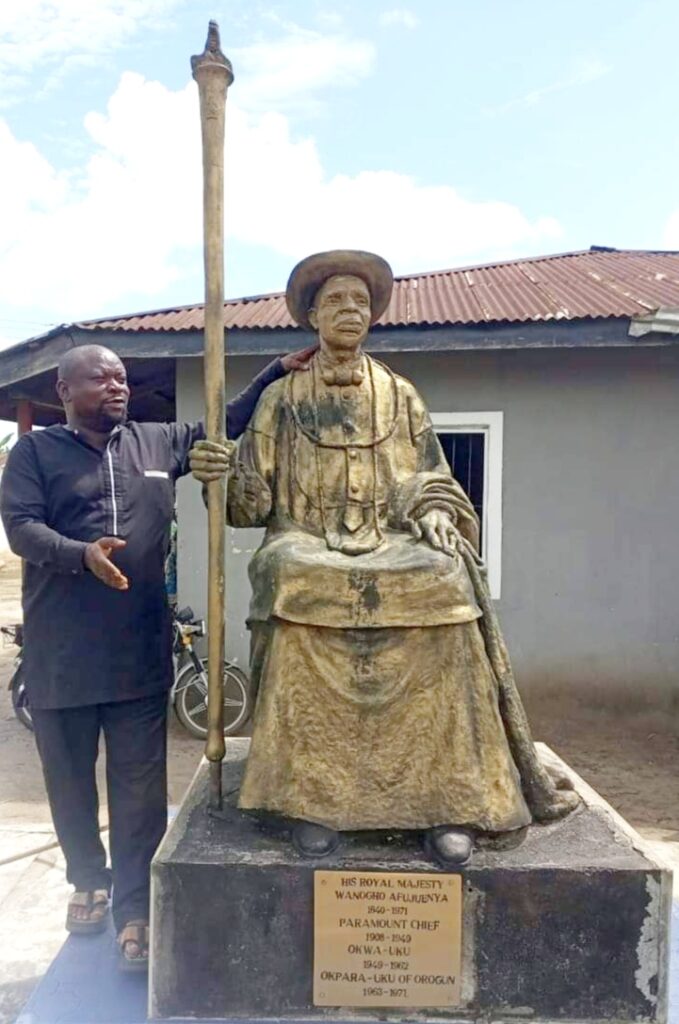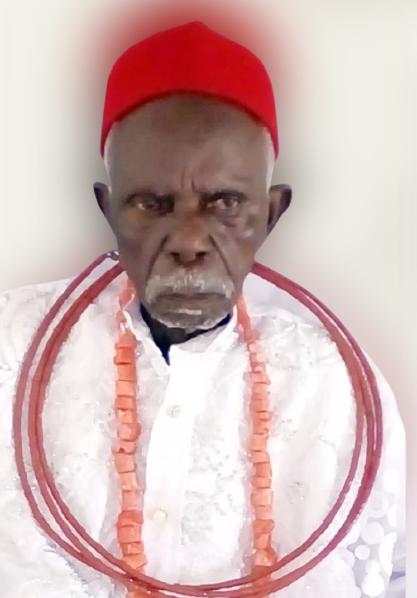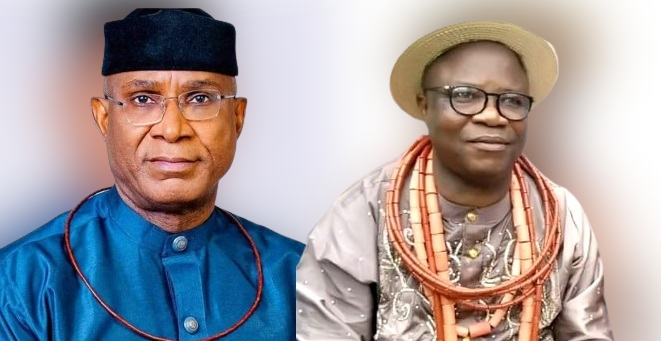Dr. Ejiro Imuere
Yesterday, I had the honor of visiting Orogun Kingdom to pay homage to a remarkable Urhobo hero, one who also happens to be among my ancestors. This great figure is none other than HRM Wanogho Afujuenya of Orogun Kingdom. You can find a brief account of his life and deeds in the inscription located just beneath his statue, as shown in the picture below.

My journey into this story begins with my upbringing in Ovu Inland, Agbon Kingdom, back in 1984. As a young lad in those days, my father would regale me with tales of this extraordinary man. Little did I know that these stories would come to define my own connection to Orogun’s history.
In Ovu Inland, the street I called home was Ikpeyi Street, renowned for its association with fishing and hunting. The youths of our street were known for their strength and industriousness, traits I admired, and often joined them on their hunting expeditions.
One fateful day during a hunting trip, tragedy struck. Our loyal hunting dog, Pistol, was accidentally shot, mistaking him for another animal. The faithful dog perished instantly. It was a sorrowful moment for all of us, but life had to go on. The decision was made to utilize Pistol’s meat for a dish known as “Ukodo” or porridge.
As I headed home to collect my plate to partake in the meal, my father intervened. He asked, “Boy, where are you going?” I responded, “I’m going to get my share of the ‘Dog Porridge’ (Ukodo).” His immediate response was an unequivocal order not to attempt it and to stay put.
He gathered me and other members of our household and shared a revelation that reshaped my understanding of our family lineage. It was on that day that I discovered my connection to Orogun. Until then, I had believed that I was solely of Agbarha and Okpara descent, utterly unaware of my ties to Orogun.
My father explained the intricacies of our patrilineal society, where the matrilineal lineage often fades into obscurity, even up to the third generation. He went on to describe the significance of Orogun’s cultural heritage, emphasizing that both the dog and iguana were considered totems in Orogun, making their consumption taboo.
He recounted the personal tragedy of losing his own mother at a young age, an event that left him with fragmented memories. His mother, Ikpeya, was the daughter of a woman named Igini. Igini, in turn, was one of the many daughters of the great Orogun figure named Uwanogho. It was Igini, my grandmother, who raised him, which accounts for his fluency in the Ukwuani language.
Since that day, my father forbade the consumption of dog meat. Despite my attempts to dismiss it as mere superstition, I never found the courage to defy his decree.
Orogun stands as a unique Urhobo clan and kingdom, distinguished by its bilingual nature. Its people fluently speak both Urhobo and Ukwuani languages, a testament to the rich tapestry of their history.

Many years ago, a Bini warrior named Efe migrated from Benin to this region. He married Oriaria, the daughter of a prominent figure named Owhowha. Oriaria was a direct sister to Ughelli but a half-sister to Ogor and Agbarha, who shared the same mother. Oriaria, after a prolonged pregnancy, gave birth to Orogun.
Efe also had another wife, a Ukwuani woman, with whom he had children, including Abbi, Amai, Ogume, and more. This unique familial structure allowed Orogun to assimilate the customs and traditions of both his Bini father and Urhobo mother.
Over time, Orogun chose to identify with his mother’s people, the Urhobo, while maintaining his Ukwuani heritage. This cultural blend is evident in their bilingualism, even reflected in the title of their king, Okpara-Uku.
Despite this, Orogun has never been claimed by the Ukwuani people, even though the title of their king originates from the Ukwuani language. This stands in contrast to neighboring tribes who often lay claim to communities based on linguistic influence.
Orogun remains distinctive in its steadfast resistance to colonial influence, particularly in its monarchy system. To the British, a king wasn’t the Chief Priest or the eldest in the community, but rather a member of royalty or the royal class. Consequently, when the British encountered this traditional form of monarchy, they replaced it with Warrant chiefs and reduced their roles to mere spiritual leaders within the clan. This shift in governance prompted many Urhobo societies to transition from their traditional Gerontocracy to Monarchy, instituting Ruling houses.
Remarkably, Orogun has steadfastly clung to its Gerontocracy to this day. The title of king typically goes to the oldest man, provided they hail from the Umusu Ruling House, which includes Echi, Opia, Olise, and Araode- a testament to their belief that it’s God’s will, expressed through age, that determines kingship, rather than birthright or wealth status. This steadfast commitment to tradition sets Orogun apart and showcases its dedication to preserving its cultural heritage.
Wanogho Afujuenya, my great-ancestor, served as the 22nd Okpara-Uku of Orogun until his passing in 1971. His legacy lives on, and the list of Okpara-Uku leaders has continued to grow since 1977, marking a topic for future research.
The lineage of the Okpara-Uku continued beyond HRM Wanogho Afujuenya, and a record I retrieved from the Midwest archives in 1977 sheds light on those who followed in his footsteps. Prior to Chief Wanogho Afujuenya, several notable individuals served as Okpara-Uku, shaping the history and destiny of Orogun Kingdom:
- Unknown, but Presumably Orogun himself
- Omoga
- Eduozor
- Umudakpo
- Igboh
- Eborbor
- Egwuenu Oba
- Erorioma
- Imite Omiri
- Odumoro
- Ohwojare
- Obaro
- Izomor
- Onyema
- Eferharo
- Atakurhievwe
- Ohwojaro
- Itebite
- Ogbiete
- Onomuodaka
- Iwhemjivwe
- WANOGHO AFUJUENYA
Since that time, more individuals have assumed the role of Okpara-Uku, representing the continuity of leadership in Orogun Kingdom. This topic holds promise for future research, as we aim to trace the lineage and contributions of subsequent Okpara-Ukus who have carried the torch of Orogun’s rich heritage.
Under the leadership of HRM Omoefe Ozenikpe 1, the reigning Okara-Uku of Orogun and Chief Barr. Benson Ndakara, as President-general, this kingdom finds itself in a strategically advantageous position. It boasts of a recently established Federal Polytechnic, a Power Sub-station, with a campus of the Nigerian Law School, an Oil and Gas Park, and Defence Space Academy in the pipeline, all courtesy of Senator Ovie Omo-Agege, the immediate past Deputy President of the Senate.

Orogun’s accessibility is greatly enhanced by a well-connected road network, firmly establishing it as a prime hub for potential development. This thriving kingdom shares its borders with neighboring communities, further amplifying its significance. A mere 15-minute car ride links Orogun to Agbarha and Ughelli. A 10-minute drive connects Orogun to Kokori in Agbon Kingdom. Similarly, Eku in Agbon is just a 10-minute car ride away. Abbi in Ukwuani is a quick 5-minute car journey from Orogun.
The neighboring communities of Emevor in Isoko, Owhelogbo in Isoko, and Abraka through Eboh Orogun are also easily accessible within 10 minutes by car. This strategic geography positions Orogun as a pivotal nodal settlement, facilitating connectivity and the potential for robust development.
Orogun’s significance transcends its geographical advantages. This kingdom has contributed significantly to the Urhobo nation, producing eminent sons who have held key positions of leadership. Among them are a Deputy Governor, a Deputy Senate President, and distinguished judges.
As we celebrate Orogun and its rich history, it’s clear that this kingdom is not just a place on the map but a living testament to the resilience of its people and their commitment to preserving their cultural heritage. In a world where traditions are often diluted by external influences, Orogun stands as a beacon of cultural authenticity.
In conclusion, the future of Orogun is bright, with its unique blend of cultures, rich history, and strategic location, and is indeed primed by nature for development. Its story is a reminder of the importance of preserving our cultural heritage and the profound impact it can have on shaping our identities and values.
Orogun Wadooooo!
Urhobo Wadooooo!
